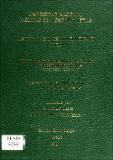| dc.contributor.advisor | Reyes A., Irma | |
| dc.contributor.author | Amador Blanco, Inés | |
| dc.contributor.author | Castro Castro, Maria Enriqueta | |
| dc.date.accessioned | 2020-08-04T23:36:34Z | |
| dc.date.available | 2020-08-04T23:36:34Z | |
| dc.date.issued | 2004 | |
| dc.identifier.uri | http://hdl.handle.net/11056/17823 | |
| dc.description.abstract | Si bien en Costa Rica existe una serie de leyes que se orientan en el sentido
de otorgar a la mujer los derechos que le corresponden como ser humano, es aún
mucho Io que falta por lograr. Durante el Siglo XX, el camino recorrido para ir
conquistando estos derechos ha sido largo y tortuoso, y no fue sino hasta
mediados de la centuria pasada que tuvo resultados. De ahí en adelante, a tono
con el avance en la conquista de sus derechos en el mundo entero, pero
especialmente a partir de la de la década de 1980, se ha sucedido una serie de
leyes que profundizan, en sentido positivo, hacia esta dirección.
Sin embargo, el Estado costarricense se ha caracterizado por no tener una
acción coordinada de todas las medidas que ha tomado al respecto, lo cual tiene
como resultado una menor efectividad que la deseada. Diversas instancias
gubernamentales creadas específicamente para tratar, tanto ésta como otras
problemáticas, que entre sus políticas generales incluyen también aspectos que le
atañen a la mujer, trabajan por su cuenta con mínimos niveles de coordinación.
Ante el panorama descrito, varias mujeres tomaron la decisión de crear una
instancia que coordinará estos esfuerzos y, además, centralizará las iniciativas que,
en torno a la problemática femenina, se plantean ante la Asamblea Legislativa. Se
trata del Parlamento de las Mujeres, terna central del presente trabajo. | es_ES |
| dc.description.abstract | Although in Costa Rica there are a series of laws that are oriented in the sense
to grant women the rights that correspond to them as a human being, is still
much that remains to be achieved. During the 20th century, the path traveled to go
conquering these rights has been long and tortuous, and it was not until
the middle of the last century that had results. Thereafter, in tune
with the advance in the conquest of their rights in the whole world, but
especially since the 1980s, a series of
laws that deepen, in a positive sense, in this direction.
However, the Costa Rican State has been characterized by not having a
coordinated action of all the measures it has taken in this regard, which has
as a result less effective than desired. Various instances
created specifically to deal with, both this and other
problematic, which among its general policies also include aspects that
they concern women, they work on their own with minimal levels of coordination.
Given the described scenario, several women made the decision to create a
instance that will coordinate these efforts and, in addition, will centralize the initiatives that,
around the feminine problem, they are raised before the Legislative Assembly. I know
deals with the Women's Parliament, the central topic of this work. | es_ES |
| dc.description.sponsorship | Universidad Nacional, Costa Rica | es_ES |
| dc.language.iso | spa | es_ES |
| dc.publisher | Universidad Nacional, Costa Rica | es_ES |
| dc.rights | Acceso abierto | es_ES |
| dc.rights | Attribution-NonCommercial-NoDerivatives 4.0 Internacional | * |
| dc.rights.uri | http://creativecommons.org/licenses/by-nc-nd/4.0/ | * |
| dc.subject | PARTICIPACIÓN DE LA MUJER | es_ES |
| dc.subject | POLÍTICA | es_ES |
| dc.subject | COSTA RICA | es_ES |
| dc.subject | MUJERES EN LA POLÍTICA | es_ES |
| dc.subject | WOMEN'S PARTICIPATION | es_ES |
| dc.subject | POLITICS | es_ES |
| dc.subject | WOMEN IN POLITICS | es_ES |
| dc.title | Parlamento de las mujeres de Costa Rica: una opción democrática de participación femenina | es_ES |
| dc.type | http://purl.org/coar/resource_type/c_7a1f | es_ES |
| una.tesis.numero | 5255 | es_ES |
| dc.description.procedence | Instituto de Estudios Latinoamericanos (IDELA) | es_ES |


